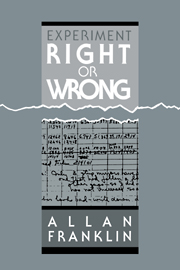Book contents
- Frontmatter
- Contents
- Preface
- Acknowledgments
- Introduction
- I EXPERIMENT AND THE DEVELOPMENT OF THE THEORY OF WEAK INTERACTIONS: FROM FERMI TO V-A
- II TOWARD A PHILOSOPHY OF EXPERIMENT
- 6 Experimental results
- 7 The roles of experiment
- 8 Do mutants have to be slain, or do they die of natural causes? The case of atomic parity-violation experiments
- Conclusion
- Appendix
- References
- Index
6 - Experimental results
Published online by Cambridge University Press: 15 September 2009
- Frontmatter
- Contents
- Preface
- Acknowledgments
- Introduction
- I EXPERIMENT AND THE DEVELOPMENT OF THE THEORY OF WEAK INTERACTIONS: FROM FERMI TO V-A
- II TOWARD A PHILOSOPHY OF EXPERIMENT
- 6 Experimental results
- 7 The roles of experiment
- 8 Do mutants have to be slain, or do they die of natural causes? The case of atomic parity-violation experiments
- Conclusion
- Appendix
- References
- Index
Summary
A skeptical reader, after reading the history presented in the first five chapters, might question whether or not science is the reasonable enterprise based on valid experimental evidence that I believe it is. They might say that the demonstrated fallibility of experimental results, of theoretical calculation, and of the comparison between experiment and theory casts serious doubt on that assertion. I agree that the fallibility is worrisome, but I also believe that the corrigibility shown gives us hope that science is indeed a reasonable enterprise. We not only learn from our mistakes, but we are able to correct them. In this chapter I will argue that we have good reasons for belief in the validity of experimental results. I will discuss later how we can use the results in the construction of a reasonable, dare one say, rational, science.
THE BAYESIAN APPROACH TO THE PHILOSOPHY OF SCIENCE
I will adopt a Bayesian approach to the philosophy of science. Bayesianism is based on the idea that we have degrees of belief in statements or hypotheses, and that these degrees of belief obey the probability calculus. [For an excellent introduction to the Bayesian view see Howson and Urbach (1989).] There has been considerable discussion of what kind of probabilities these are. I believe that they are subjective probabilities reflecting the judgments of scientists.
- Type
- Chapter
- Information
- Experiment, Right or Wrong , pp. 99 - 141Publisher: Cambridge University PressPrint publication year: 1990



